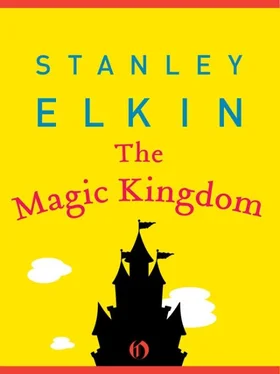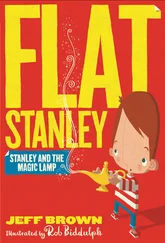“You know what money means to Noah.”
“I’m only trying to make it interesting. I’m trying to make it interesting for us all. You bet too. Bet me my ghost story can’t make him cry.”
“Wait a minute,” Noah said. “What do I get if it doesn’t? What do you forfeit?”
Maxine considered. “Forty dollars,” he said. “And I’ll lay you two-to-one odds.”
“Noah?”
“Go ahead,” Noah said, “he can’t do it.”
“They laid their bets down and Benny began.
“Once upon a time,” he said, “there was this lad name of Noah Cloth—”
“Benny!”
“— lad name of Noah Cloth. Now Noah was a fine little fellow in all respects save one. He was even quite properly named, Noah was, for he had a disease and ripped real easy. Easy as cloth! The disease was called osteosarcoma, a deadly cancer, and it was the single most common bone tumor in children. There was only one way to deal with it, and that was to amputate. Wherever it showed up, that’s where Noah’s doctors had to cut. If it showed up in a finger they would chop off the finger; if it showed up in a leg the leg would come off.”
“No fair.”
“No fair?”
“No, no fair. You said a ghost story.”
“What’s no fair? He dies,” Benny argued reasonably. “I kill him, he dies. The bone cancer gets him. He dies. He dies and comes back. He appears to his poor grieving parents, his sorrowful mum, his heartbusted dad.” He glanced over at Noah to gauge the boy’s reaction. The kid was chewing his lips, but Benny couldn’t tell whether he was on the verge of tears or laughter. “It’s not too late to back out,” he said. “You want to back out?” The boy shook his head. Benny continued his tale.
“Though the cancer took a long time to tear through Cloth, Noah wasn’t even into his teens when he passed. When he finally died there almost wasn’t enough left of him to put in the ground. I mean, he was that cut up. All they could put together for his little casket — from its size you’d think they were burying a small dog — were the pieces of his face and head they hadn’t had to saw on yet: some of his jawbone, the long bone that supports his nose, the bony socket of his left eye like the mounting for a missing jewel, pieces of skull like bits of pottery. And the remains of his diseased frame all wired up like the dinosaur in the museum. There was an elbow like a patch on a jacket. There was some shin, a fragment of ankle, maybe a sixth of his spine. There was his pelvis all eaten away and looking like a hive and, curiously, most of the toes on his right foot.”
Benny Maxine looked sharply at Noah Cloth. It wasn’t pleasant what he had to do next, but his honor as a gambler was at stake. Still, if the kid had shown him only the merest sign of submission he would have called it off. He stared at Noah. It wasn’t laughter or tears that struggled for supremacy. Terror sat in his face like a tic.
Benny took a deep breath, rose from the chair in which he’d been sitting, and slowly paced along the wall as he spoke.
“Noah Cloth died on an operating table in a hospital in Surrey on the Tuesday following his twelfth birthday.”
The children gasped and Benny Maxine went on.
“The undertakers had to work on him harder than ever the surgeons did just to make him acceptable for Christian burial. They did him with wax and with wire, working from the photographs of infants as their model. They wrapped him in a shroud and, obedient to the wishes of Mr. and Mrs. Cloth, buried him at midnight in an unmarked grave away from the sight of men. No one was permitted to come to the funeral. Even the Cloths stayed away.
“His cerements decayed in the damp grave. The wax that held him together dissolved and returned to the earth. The wires that ran through what was left of his bones rusted and became a part of the generalized tetanus of the world, and Noah Cloth was reduced, shrunken, boiled down, distilled into a sort of pointless dice. He was no longer, if he ever had been, a part of the respectable dead. Terminally ill from the day he was born, chipped away at and chipped away at by disease, nickel-and- dimed by the scalpels and hacksaws of his doctors, he was as unfit for the grave as he was for the world, and his spirit, caged now in that scant handful of spared, untouched bone like the undiscarded remnant marble of the sculptor’s intention, rose up from the vast lake of the dead and returned one night to his parents’ flat, there to bury itself in the bed he’d slept in as a boy, in the small room which, when he’d not been in hospital, had been his grave in life!
“It was Mrs. Cloth who first heard the macabre rattle of his bones. She was in bed and very frightened and tried to rouse her husband, for the queer click sounds that Noah made in death were not unlike the sounds her boy had made in life. She shook him and shook him but he would not rouse. ‘Husband,’ she hissed in his ear, ‘husband, wake up! There are noises coming from Noah’s room!’ But his son’s life and his son’s death had taken so much from the poor man that he slept as one dead himself. So Mrs. Cloth got out of bed and followed the queer chattering sounds like the frozen blood-barren noises of men exposed to the cold.
“She reached her son’s room and snapped on the light.”
Benny paused, his back against the wall, studying Noah. Noah watched him, not daring to breathe. “Noah?” Benny called in a perfect rendition of a ruined mother’s cracked old voice. “Noah, is that you?” And seemed in very fright and weakness to swoon, his back and neck buckling, in that precise instant catching the master switch that controlled the electricity in the room and with one smart swift convulsion plunged 822 into total darkness.
Here is what happened.
Janet Order and Lydia Conscience screamed.
Benny Maxine got his cry out of Noah Cloth.
Tony Word bit his tongue and wondered if he’d infected himself.
Charles Mudd-Gaddis thought for a moment that he had fallen asleep.
Rena Morgan caught her breath and marveled at Benny Maxine’s timing.
Mickey Mouse materialized on the ceiling in full color.
Pluto stood behind the Mouse’s shoulder staring down at the children.
Because everything has a reasonable explanation.
In complete darkness — the tightly drawn drapes, the lightproof rubberized curtains behind them, the room’s somber-toned, dark-olive furniture, the plastic cards removed from the top of the television, the very thickness and density of the children themselves — the hidey-hole functioned exactly like a sort of camera obscura.
Because everything has a reasonable explanation.
The protective peephole in the door through which guests could observe their callers before admitting them had, in 822, been inadvertently reversed, installed in concave rather than convex relation to a guest’s eye (not only a reasonable explanation, but a positively scientific one), the glazed, grommetlike eyepiece turned into a sort of light-collecting lens.
Everything.
In a normal camera obscura the image would have been projected onto a facing surface, the patternless brown drapes. That’s what should have happened in 822. So why the ceiling? Because it was a room in a major hotel catering to guests not only from all over the country but from all over the world, to guests of different social, ethnic, and religious backgrounds, to smokers and nonsmokers, to people who lit votive candles, to romantics on their first honeymoons or even on their second or third, to men and women not on honeymoons at all but quite as romantic as the just-marrieds, who took their meals from room-service carts by the light of flickering candles, to adolescents and a range of the mystic-inclined who would not live in an unmediated environment and burned incense at the altar of their senses. So, in a way, Mickey and Pluto were on the ceiling rather than on the drapes because of the fire regulations and the insurance premiums, the thin layer of slightly glossy fire retardant on the drapes, which, just out of plumb from vertical true, canted their images down onto the retardant-soaked rug, which bounced the light off the floor and refracted it onto the ceiling. That’s why.
Читать дальше












